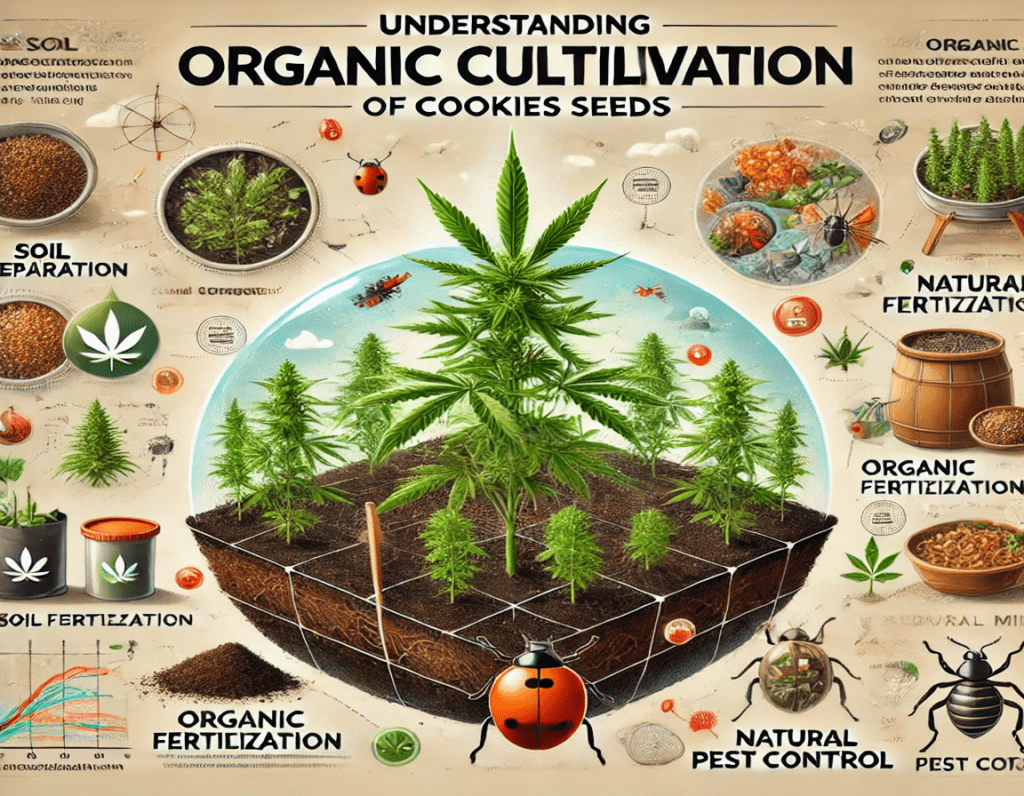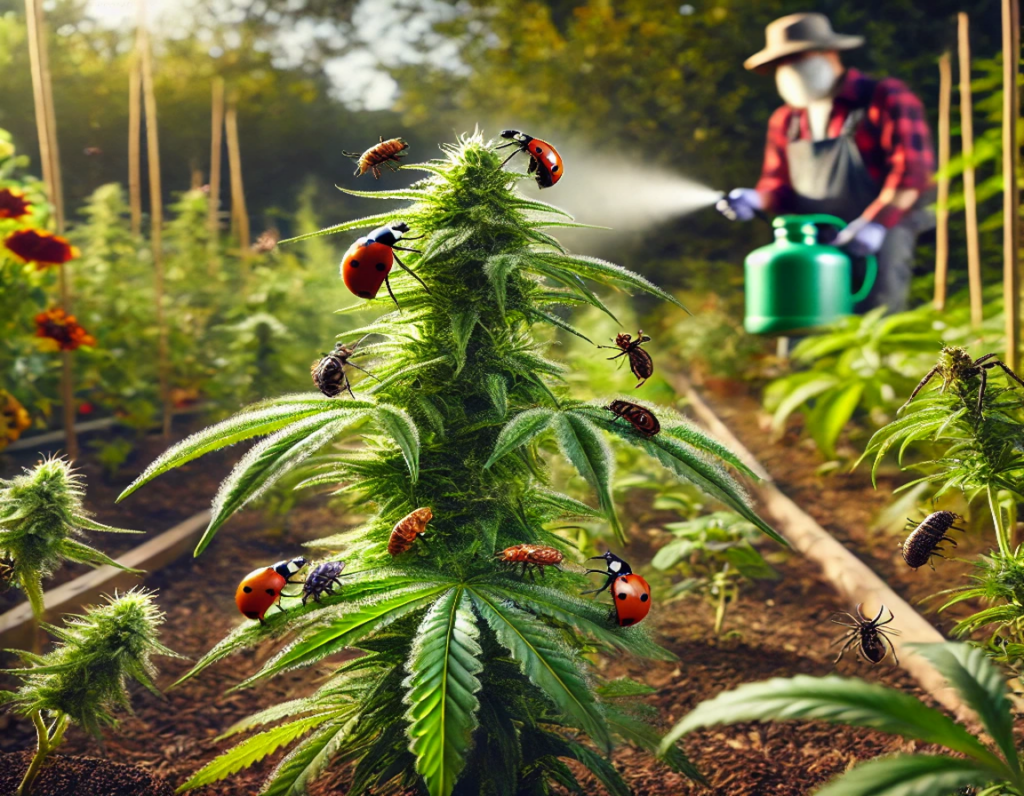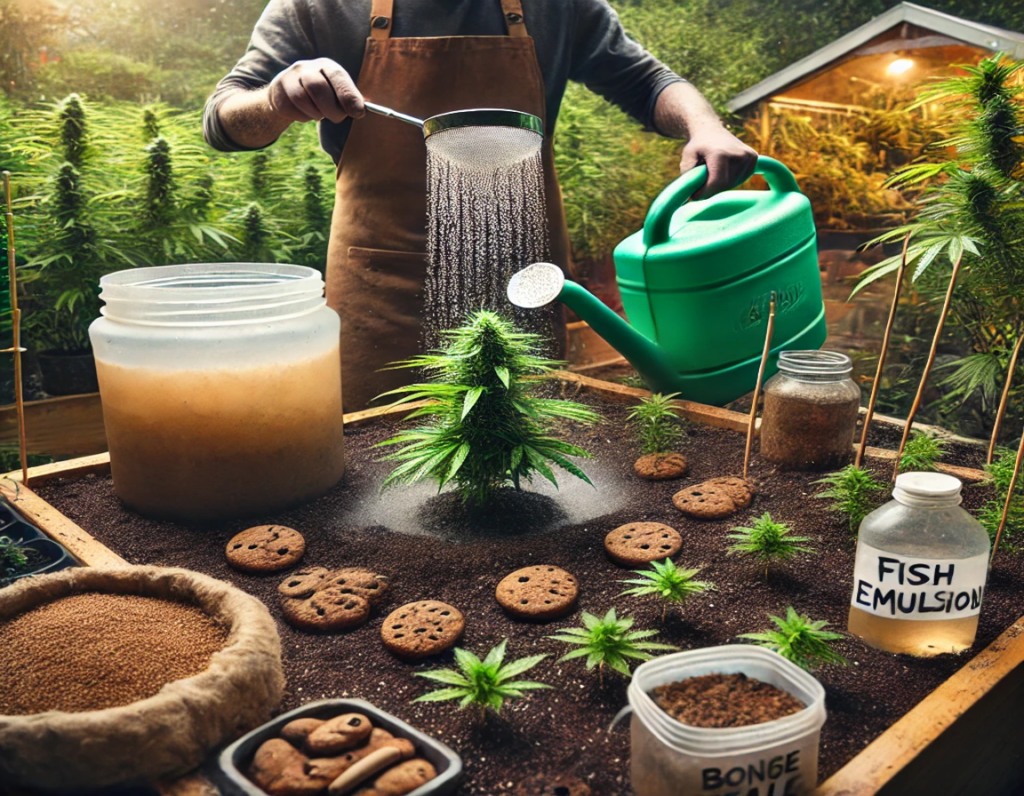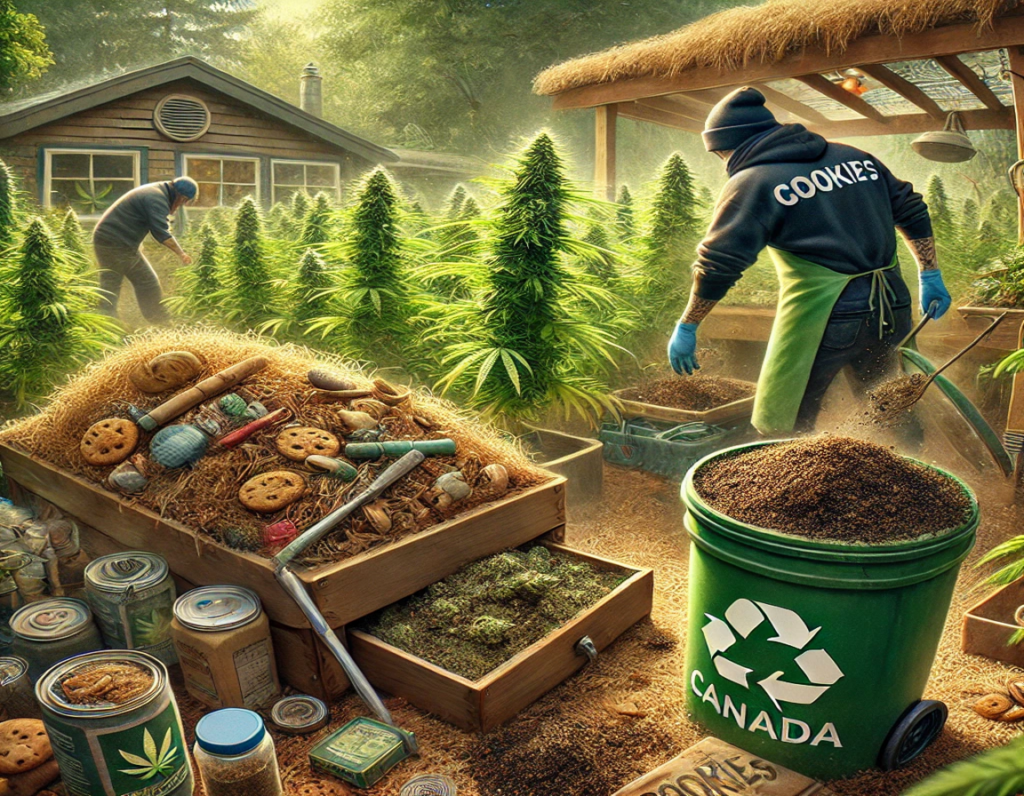
It emphasizes natural techniques, including soil preparation, organic fertilization, and natural pest control, to promote healthy plant growth without the use of synthetic chemicals. By selecting the right Cookies strains and focusing on composting, mulching, and water management, Canadian growers can successfully cultivate high-quality cannabis plants using sustainable, organic methods.

When cultivating Cookies seeds organically in Canada, the first critical step is selecting the right strain. Canada’s climate, particularly in its northern and cooler regions, can present unique challenges, but several Cookies strains are well-suited for organic cultivation.
Are two excellent options for outdoor growing in Canada’s cooler environments. They are resilient and capable of thriving in less-than-ideal conditions, such as short summers and fluctuating temperatures. These strains can handle the challenges posed by outdoor organic growing, adapting well to natural inputs and fluctuating climates.
For growers who prefer indoor or greenhouse environments. These strains tend to perform better in controlled settings where temperature, humidity, and other factors can be managed. By selecting strains that match your growing environment, you increase the likelihood of a successful harvest using organic methods.
To ensure the best results, choose seeds from a reputable source. Organic cultivation requires strong genetics for plants to thrive without chemical intervention. Reliable seed suppliers can guarantee that your Cookies seeds are genetically stable, improving the plants’ ability to adapt to organic practices.

Once you’ve selected the appropriate Cookies strain, the next step is preparing your soil. The foundation of organic cultivation is healthy, living soil. Unlike conventional farming, which often relies on synthetic fertilizers, organic growing prioritizes soil that supports a diverse range of microorganisms, which in turn nourish your plants.
In Canada, organic growers should focus on enriching their soil with compost, worm castings, and natural fertilizers like bat guano or kelp meal. These materials are rich in nutrients that provide a slow-release food source for your Cookies plants. Compost is particularly beneficial because it adds organic matter to the soil, improving its texture and water retention.
Given Canada’s sometimes unpredictable weather, particularly in outdoor settings, ensuring proper soil drainage is essential. Too much moisture can lead to root rot or other issues, so incorporating materials like perlite or sand into your soil mix can help maintain the right moisture balance.
Soil health in organic growing is an ongoing process. Throughout the growing season, add organic compost teas or natural soil conditioners to maintain nutrient levels and promote the growth of beneficial microbes. This practice helps build a robust soil ecosystem that will support your plants throughout their lifecycle.

Pest management is one of the most challenging aspects of organic cultivation, but it’s essential for a successful crop. The goal is to protect your Cookies plants from harmful insects without resorting to chemical pesticides that could disrupt the soil or harm beneficial organisms.
In an organic setup, beneficial insects such as ladybugs and predatory mites are among the most effective natural pest control methods. These insects prey on pests like aphids, spider mites, and other harmful bugs that could damage your plants. Introducing these beneficial insects into your growing area creates a natural balance, reducing the need for chemical intervention.
Another effective organic pest control strategy is using natural sprays such as neem oil or insecticidal soap. These products are made from plant-based ingredients and can help control pest populations without harming your plants or the environment. When applied properly, they can prevent infestations while maintaining the integrity of your organic growing setup.
Is another excellent method of natural pest control. Planting herbs like basil, marigold, or lavender near your Cookies plants can help deter pests naturally. These plants emit scents that repel certain insects, providing an additional layer of protection.
A healthy plant is less susceptible to pests, so maintaining balanced nutrition and ensuring optimal growing conditions will also help reduce pest pressure. Strong plants can naturally fend off many common pests.

Watering is a fundamental aspect of any cultivation process, but in organic growing, it’s particularly important to ensure the water you use is free from harmful chemicals. In many parts of Canada, tap water contains additives like chlorine or fluoride, which can harm your soil’s beneficial microorganisms and negatively impact plant health.
Whenever possible, use rainwater or filtered water for watering your Cookies plants. Rainwater is naturally soft and free of chemicals, making it an ideal choice for organic growers. If rainwater collection isn’t feasible, consider using a water filtration system to remove unwanted chemicals from your tap water.
Proper nutrient management is key to supporting the healthy growth of your Cookies seeds. In organic growing, you’ll want to rely on slow-release organic fertilizers like fish emulsion, bone meal, or alfalfa meal. These natural fertilizers break down slowly, providing a steady source of nutrients over time. This ensures your plants have access to essential nutrients throughout their growth cycle without the risk of nutrient burn, which can occur with synthetic fertilizers.
In addition to organic fertilizers, applying compost teas or organic liquid fertilizers can help boost plant health during critical growth phases. These organic nutrient solutions enrich the soil with beneficial microbes and add essential nutrients in a way that supports long-term soil health.

Composting is a vital component of organic cultivation, and in Canada, it’s an excellent way to recycle natural materials while enriching your soil. Composting allows you to take kitchen scraps, garden clippings, and other organic waste and turn them into a rich, fertile substance that nourishes your soil.
By creating your own compost, you can ensure that your soil is full of the nutrients your Cookies plants need to thrive. Compost is teeming with beneficial microorganisms that help break down organic matter into nutrients that your plants can absorb. Additionally, compost improves soil structure, making it more capable of retaining moisture and nutrients.
In an outdoor setting, particularly in Canada’s cooler regions, mulching can be incredibly beneficial. Mulching with organic materials such as straw, leaves, or wood chips helps regulate soil temperature and retains moisture. This is particularly useful in Canada, where weather conditions can fluctuate dramatically between seasons.
Mulch also helps suppress weeds, which compete with your Cookies plants for water and nutrients. By maintaining a healthy layer of organic mulch, you’ll protect your soil, conserve moisture, and ensure that your plants are free to grow without competition from invasive plants.

Once your Cookies plants have matured, it’s time to focus on the harvest. Timing is crucial; the best moment to harvest is when the trichomes on your plant’s buds turn from clear to a cloudy or amber hue, indicating optimal potency. Harvesting too early or too late can affect the final quality of your crop.
After harvesting, the curing process is key to maintaining the flavor and quality of your organically grown buds. Start by drying the buds in a dark, cool, and well-ventilated space for about 7-10 days. Ensure airflow is consistent to avoid mold development. Once dry, transfer the buds to airtight containers for curing, allowing them to “breathe” by opening the containers for a few minutes each day. This process should last a minimum of 2-3 weeks to enhance the flavor and aroma of your Cookies strain.
By taking care during the harvesting and curing stages, you preserve the organic integrity of your Cookies crop, ensuring a high-quality product for consumption.
When cultivating Cookies seeds organically, choosing the right strains based on your environment is essential. Organic soil preparation with compost and natural fertilizers ensures a nutrient-rich growing medium, while natural pest control methods like beneficial insects and companion planting help protect plants. Proper watering with clean sources like rainwater, along with the use of organic fertilizers, promotes healthy growth. Composting and mulching support soil health, improve moisture retention, and regulate temperature. Harvesting at the right time and curing the buds correctly will preserve the quality and potency of your organic crop.
Girl Scout Cookies and Animal Cookies are ideal for organic outdoor cultivation in Canada’s cooler climates. Their hardiness makes them well-suited for natural environments.
Enrich your soil with compost, worm castings, and organic amendments like bat guano or kelp meal. Add compost teas regularly to maintain nutrient levels.
Use beneficial insects such as ladybugs or predatory mites and natural sprays like neem oil to keep pests under control. Companion planting can also help repel unwanted insects.
Water your plants consistently, ensuring you use rainwater or filtered water to avoid introducing harmful chemicals. Monitor soil moisture to prevent overwatering.
Organic fertilizers like fish emulsion and bone meal offer slow-release nutrients that don’t overwhelm your plants. They improve soil health and support plant growth over time.
Yes, mulching helps retain soil moisture, regulate temperature, and suppress weeds. It’s especially helpful in outdoor gardens, where weather can be unpredictable.
We ship and deliver world wide via USPS and various couriers.
We offer a wide range of secure and anonymous online payment options.
We care about you, our customer. Please contact us with any questions or concerns.
Find out more about the benefits of being a loyal and regular customer.
WE ARE EVERY GROWERS ONE STOP SHOP TO ACQUIRE PREMIUM CANNABIS SEEDS FOR SALE IN THE USA, CANADA AND AUSTRALIA

Farmers Lab Seeds 2024, | All Right Reserved
Seeds are sold as novelty items, souvenirs, and collectibles. They contain 0% THC. We encourage our customers to check the legislation in their Country, State, Province, and Municipality prior to purchasing items from our store. We do not provide growing information.
All seeds are sold as hemp, and lab tested under 0.3% THC. This product is not for use by or sale to persons under the age of 21. This product should be used only as directed on the label. It should not be used if you are pregnant or nursing. Consult with a physician before use if you have a serious medical condition or use prescription medications. A Doctor’s advice should be sought before using this and any supplemental dietary product. All trademarks and copyrights are property of their respective owners and are not affiliated with nor do they endorse this product.
These statements have not been evaluated by the FDA. This product is not intended to diagnose, treat, cure or prevent any disease. Individual weight loss results will vary. By using this site, you agree to follow the Privacy Policy and all Terms & Conditions printed on this site. Void Where Prohibited by Law.